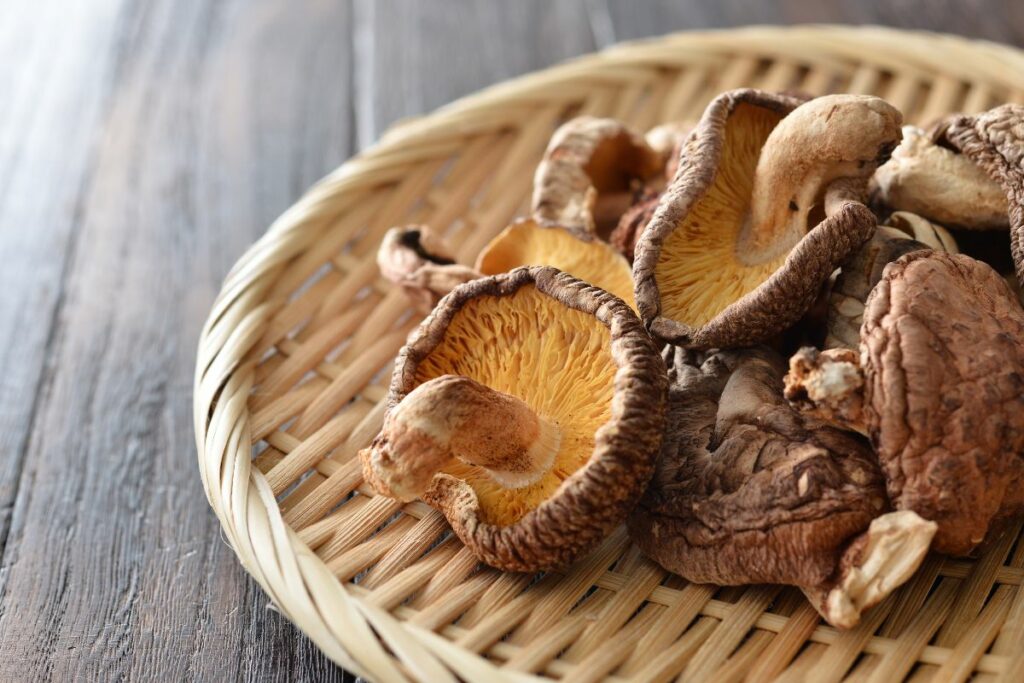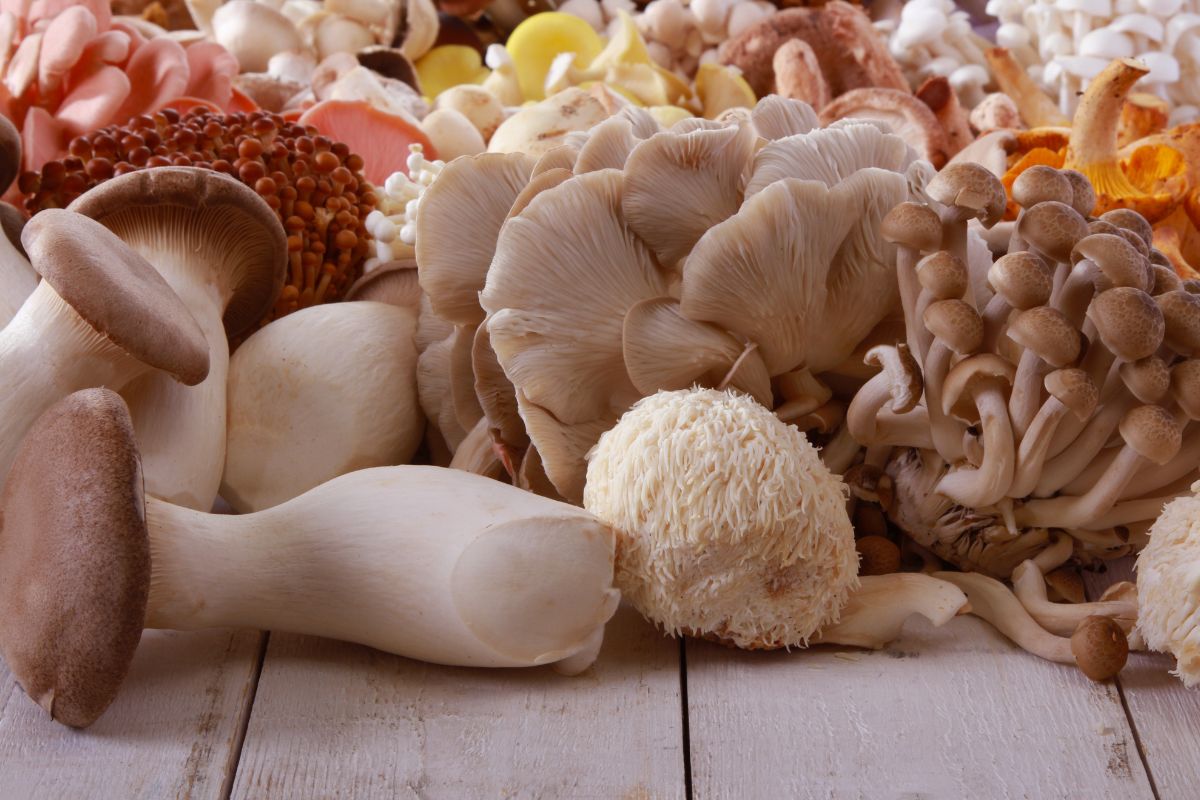Adaptogenic mushrooms have garnered attention in recent years for their potential to enhance overall well-being and resilience to stress. These unique fungi are a subset of adaptogens, which are natural compounds found in plants and mushrooms that help the body cope with various stressors. By supporting the body’s ability to restore balance, adaptogenic mushrooms offer valuable benefits for both physical and mental health.
Among the various types of adaptogenic mushrooms, well-known examples include Reishi, Chaga, Cordyceps, and Lion’s Mane. Each of these mushrooms possesses distinct properties that cater to different health concerns, from enhancing energy levels to promoting cognitive function. Although the mechanisms through which adaptogenic mushrooms work are still being studied, their potential contributions to maintaining and improving one’s overall well-being are increasingly recognized and embraced by many.
Incorporating adaptogenic mushrooms into one’s lifestyle is a growing trend, as they can be easily added to food, beverages, or taken as dietary supplements. The diverse range of benefits that these remarkable fungi offer make them an attractive and promising addition to the realm of holistic health care.
Understanding Adaptogenic Mushrooms
Table of Contents

Adaptogenic mushrooms are a category of medicinal mushrooms that have been used for centuries in traditional medicine, particularly in Eastern cultures. These fungi have unique properties that help the body adapt to various stressors, promoting overall health and well-being.
There are several types of adaptogenic mushrooms available, each with distinct health benefits. Some of the most popular adaptogenic mushrooms include Reishi, Chaga, Cordyceps, and Lion’s Mane.
- Reishi mushrooms, also known as “Lingzhi” in Chinese medicine, have been used for their adaptogenic properties. They are known for supporting the immune system, promoting relaxation, and improving sleep quality.
- Chaga mushrooms, native to colder climates such as Siberia, are packed with antioxidants and are known for their anti-inflammatory and immune-boosting properties. They can also help lower blood sugar levels and improve overall vitality.
- Cordyceps mushrooms are unique in that they grow on the bodies of insects. These fungi are known for their energy-boosting properties and are often used by athletes to improve performance, stamina, and overall endurance.
- Lion’s Mane mushrooms don’t just look interesting with their shaggy appearance, but they also possess amazing cognitive benefits. They are known for promoting brain health, improving memory, focus, and mental clarity.
It is necessary to understand the purpose of the adaptogenic mushroom you are considering, as each one may address different health concerns and can be prepared and consumed in various ways depending on individual preferences.
Incorporating adaptogenic mushrooms into your daily routine can be as simple as adding them to soups, teas, smoothies, or supplementing them in capsule form. These powerful fungi can provide a wealth of health benefits, making them an excellent addition to a well-balanced diet and lifestyle.
History and Ayurvedic Tradition of Adaptogens
Adaptogens are a unique class of herbs and mushrooms that help the body adapt to stress, as well as to maintain overall balance and vitality. The term “adaptogen” gained traction in the mid-20th century, but the concept of using certain plants to promote overall health and resilience dates back thousands of years. Adaptogens have long been an integral part of traditional medical systems such as Ayurveda and Traditional Chinese Medicine (TCM).
Ayurveda, a holistic healing system that originated in India over 3,000 years ago, employs a range of adaptogenic herbs to help individuals find balance in their physical, mental, and spiritual wellbeing. These adaptogens are revered for their ability to nourish the body, improve vitality, and help the body resist stressors.

Some well-known Ayurvedic adaptogenic herbs include Ashwagandha, Tulsi (Holy Basil), and Shatavari. Ashwagandha, for example, has been used in Ayurvedic medicine to strengthen the immune system, increase energy levels, reduce inflammation, and alleviate stress-related issues. Tulsi, on the other hand, has a long history of use as a powerful antioxidant, immune booster, and anti-anxiety agent in Ayurveda.
Adaptogenic mushrooms, such as Reishi, Cordyceps, and Chaga, also play a significant role in promoting health and wellbeing. Referred to as “nature’s pharmacy” for their diverse range of benefits, these mushrooms have been utilized in various traditional medicine practices, including Ayurveda and TCM. Reishi, known as the “Mushroom of Immortality” in TCM, has been valued for its ability to support the immune system and improve overall vitality.
The popularity of adaptogens has grown exponentially in recent years, as modern scientific research continues to validate their efficacy in promoting health, stress resistance, and overall wellbeing. The incorporation of adaptogenic herbs and mushrooms in daily life now spans beyond traditional medicine practices, as they make their way into mainstream wellness routines.
It is important to note that while adaptogens can be incredibly beneficial, they are not a cure-all or a quick fix. Instead, they work best when used consistently and in conjunction with a balanced lifestyle that prioritizes sleep, proper nutrition, and regular exercise.
Understanding Stress and its Link with Adaptogens
Stress is a common issue faced by individuals in today’s fast-paced world. It occurs when external or internal factors trigger the body’s natural response mechanisms to deal with challenge or threat. The body’s response to stress involves the release of hormones, including cortisol, by the adrenal glands. Cortisol is known to regulate various processes in the body, including immune system function, metabolism, and inflammation. However, prolonged high cortisol levels can negatively impact the body, resulting in issues such as anxiety, depression, and mood imbalances.
Adaptogens are a class of natural substances, often found in plants and fungi, that possess the ability to help the body adapt to and combat stress. They work by supporting and regulating the hypothalamic-pituitary-adrenal (HPA) axis, which is a critical component of the body’s stress response system. By modulating the HPA axis, adaptogens can help balance cortisol levels, alleviate the symptoms of stress, and promote overall well-being.
Adaptogenic mushrooms are a specific category of adaptogens that have been recognized for their stress-relieving and balancing properties. These mushrooms are known for their ability to strengthen and stabilize the nervous system, which plays a significant role in managing stress and maintaining mental health. Adaptogenic mushrooms can help address anxiety, depression, and mood imbalances by supporting the body’s natural resilience against stressors.
Among the most popular adaptogenic mushrooms are Reishi, Cordyceps, and Chaga, each containing a unique blend of bioactive compounds that contribute to their stress-relieving properties. These mushrooms can be consumed in various forms, such as herbal teas, extracts, or supplements, allowing individuals to incorporate them into their daily routine to manage stress effectively.
By understanding the connection between stress and adaptogens, it becomes clearer how incorporating adaptogenic mushrooms into a lifestyle routine can aid in managing cortisol levels, supporting the HPA axis, and maintaining a healthy nervous system. As a result, individuals can experience relief from anxiety and depression and enjoy improved mood and overall mental well-being.
Different Types of Adaptogenic Mushrooms

Adaptogenic mushrooms are a unique category of fungi that are known to have various health benefits. They help the body adapt to stress, support immune function, and promote overall well-being. In this section, we will discuss several types of adaptogenic mushrooms that are popularly used for their therapeutic properties.
- Lion’s mane (Hericium erinaceus) is a mushroom widely recognized for its potential neuroprotective and cognitive-enhancing effects. It has been studied for its ability to stimulate nerve growth factor production and support overall brain health.
- Reishi (Ganoderma lucidum) is another highly regarded adaptogenic mushroom, often referred to as the “mushroom of immortality.” Reishi is known for its calming and immune-modulating properties, as well as its potential to support healthy liver function and improve overall vitality.
- Cordyceps (Ophiocordyceps sinensis) is a unique type of fungus that grows on caterpillar larvae, and it has been traditionally used to boost energy, stamina, and endurance. Studies have shown its adaptogenic role against hypoxia stress and potential to improve exercise performance.
- Chaga (Inonotus obliquus) is a mushroom that grows on birch trees and is known for its high levels of antioxidants. Chaga has been used traditionally to support the immune system and promote overall health by neutralizing free radicals and reducing oxidative stress.
- Turkey tail (Trametes versicolor) is a colorful mushroom commonly found on decaying logs. It has been used to support immune function, particularly due to its high levels of beta-glucans, which are known for their immune-modulating effects.
- Shiitake (Lentinula edodes) is not only a popular culinary mushroom, but also a revered adaptogenic variety. It is known for its immune-boosting properties and potential to support cardiovascular health. Additionally, shiitake mushrooms may help balance cholesterol levels and promote healthy liver function.
In summary, adaptogenic mushrooms offer a diverse range of health benefits due to their unique properties. Incorporating these mushrooms into a balanced diet can help promote well-being, support immune function, and improve overall vitality. However, it’s crucial to consult a healthcare professional before adding any kind of functional mushroom to your diet.
Potential Benefits of Adaptogenic Mushrooms
Adaptogenic mushrooms are known for their ability to help our bodies cope with various forms of stress. They are particularly beneficial for those looking to improve mental and physical performance, as well as overall well-being. This section will discuss some of the key benefits of incorporating adaptogenic mushrooms into your daily routine.
One of the primary benefits of adaptogenic mushrooms is their ability to support a healthy immune system. Research suggests that these mushrooms, such as Cordyceps militaris, contain compounds that may enhance immune function and reduce inflammation. This can be particularly helpful during cold and flu season, as a strong immune system helps to ward off illness.

In addition to their immune-boosting properties, adaptogenic mushrooms can also help to combat fatigue and improve energy levels. Studies have shown that certain varieties, like Ophiocordyceps sinensis, may have adaptogenic properties that help the body to maintain homeostasis and resist stress-induced fatigue. This may result in improved stamina, focus, and cognitive function.
Mental health can also benefit from the consumption of adaptogenic mushrooms. They may help to reduce anxiety, depression, and stress by supporting the body’s natural stress response and promoting balance. Improved brain function, memory, and clarity may be experienced as these mushrooms work to enhance cognitive performance and overall mental well-being.
Adaptogenic mushrooms may also support heart health by helping to regulate blood pressure and lower cholesterol levels. This can reduce the risk of developing heart disease and promote overall cardiovascular health. By supporting blood sugar regulation, these mushrooms may also aid in the prevention and management of diabetes.
Lastly, adaptogenic mushrooms are known for their high antioxidant content, which may help to slow down the aging process by combating the harmful effects of free radicals. As a result, incorporating adaptogenic mushrooms into your daily routine could contribute to a longer, healthier life.
In conclusion, adaptogenic mushrooms offer a variety of potential benefits, from supporting immune function and mental health to promoting heart health and reducing fatigue. By including these mushrooms in a balanced diet, individuals can experience enhanced well-being and improved overall health.
Ways to Consume Adaptogenic Mushrooms
Adaptogenic mushrooms are known for their potential ability to support the body in managing stress and promoting overall well-being. There are various ways to incorporate these beneficial fungi into one’s daily routine, ensuring they can be easily enjoyed by all.
One popular method of consuming adaptogenic mushrooms is by adding them to a tea. Brewing a warm cup of mushroom-infused tea not only offers the benefits of the mushrooms themselves but also provides a soothing ritual for relaxation. Simply steep a bag containing the desired mushroom blend in hot water and enjoy throughout the day.
Another convenient way to consume adaptogenic mushrooms is in capsule form. Capsules enable individuals to easily measure their daily intake and can be taken just like any other supplement. These mushroom capsules can be found at health stores and online retailers, and they cater to those who prefer a quick, tasteless option for ingesting the fungi.
For those who enjoy experimenting with their food, incorporating adaptogenic mushroom powders allows for endless culinary possibilities. Powders can be mixed into smoothies, stirred into oatmeal, or blended into soups, making it simple to gain the benefits from these fungi while enjoying a delicious meal.
Tinctures are yet another way to enjoy adaptogenic mushrooms. These liquid extracts can be conveniently added to water, juice, or taken directly under the tongue. They often provide a highly concentrated dose of medicinal mushrooms, ensuring effective absorption and utilization by the body.
For a morning boost, mushroom coffee offers a unique way to start the day. The earthy flavors of mushrooms, like chaga and lion’s mane, pair well with coffee, providing an alternative to regular caffeinated beverages. These unique blends can be found pre-packaged or made at home by mixing mushroom powders with ground coffee beans.
Finally, for those with a sweet tooth, cacao offers an enticing method for consuming adaptogenic mushrooms. By mixing mushroom powders with raw cacao, one can create a delicious treat filled with the goodness of functional fungi and the antioxidant properties of cacao. The possibilities are endless, from homemade chocolate bars to hot cocoa, allowing individuals to satisfy their taste buds while reaping the benefits of adaptogenic mushrooms.
Research and Scientific Studies on Adaptogenic Mushrooms
Adaptogenic mushrooms have been extensively studied for their potential health benefits. These fungi are known for their ability to improve cognitive function, memory, and overall wellbeing. They can also positively affect the nervous system, immune function, and blood sugar levels.
One study on Cordyceps militaris has shown its adaptogenic properties as a part of a mixture of mushrooms. These components have demonstrated positive effects on health, including enhancing cognitive function and providing support to the nervous system.
In another research, the Chinese caterpillar mushroom, Ophiocordyceps sinensis, was found to have adaptogenic properties that help in combating hypoxia stress, which suggests potential benefits for high-altitude adaptation.
The Lingzhi or Reishi medicinal mushroom, Ganoderma lucidum, is another adaptogen with promising health benefits. An aqueous extract derived from its mycelium showed potential for modulating high-altitude-induced stress, making it a useful option for those living in or travelling to high altitude locations.

Adaptogenic mushrooms have also been explored for their positive effects on immune function. Studies suggest that some of these mushrooms can help improve overall health by strengthening the immune system and reducing the risk of diseases such as cancer and heart disease.
Furthermore, certain adaptogenic mushrooms show promising effects on physical performance and blood sugar levels. These mushrooms may help athletes enhance their overall performance and improve the health of individuals with fluctuating blood sugar levels.
In conclusion, the research on adaptogenic mushrooms supports their potential health benefits, particularly in the areas of cognitive function, memory, immunity, performance, and the regulation of blood sugar levels. Further studies are required to fully assess their impact on health and understand how these natural compounds can be utilized to promote wellbeing.
Market Overview of Adaptogenic Mushroom Supplements
Adaptogenic mushrooms have gained popularity in recent years due to their potential health benefits. These functional fungi are known to help support the body’s stress response and strengthen the immune system. The adaptogen market has grown rapidly, with various supplement companies offering a wide range of products containing these medicinal mushrooms.
In the adaptogenic mushroom supplement market, there are several key players, offering both organic and non-organic options. Consumers can choose from capsules, powders, and extracts of various mushroom species like cordyceps, reishi, and lion’s mane.
Demand for adaptogenic mushroom supplements has been fueled by increasing awareness of their purported health benefits. Research is ongoing, but some studies have suggested that these mushrooms may possess adaptogenic, stress-reducing, and immune-boosting properties.
Despite the growth in the market, it’s important to note that the supplement industry remains largely unregulated. As a result, the quality and potency of mushroom supplements can vary significantly from one product to another. Consumers should be cautious when choosing a supplement and look for products from reputable companies that follow good manufacturing practices (GMP).
In conclusion, the adaptogenic mushroom supplement market has experienced a significant rise in recent years, driven by consumer interest in natural health products and potential benefits associated with these functional fungi. Although the market offers a variety of choices, consumers should be diligent when selecting a supplement, ensuring they select products from trustworthy sources.
Safety Concerns and Side Effects
Adaptogenic mushrooms have gained popularity in recent years due to their potential health benefits. However, it is important to consider the safety concerns and possible side effects associated with their consumption.
As with any supplement, individuals should be cautious when trying adaptogenic mushrooms, as there is a potential for allergic reactions. It is recommended to start with a small dose and monitor any signs of an allergic response. Symptoms may include itching, hives, and swelling.
Breastfeeding women should consult their healthcare provider before consuming adaptogenic mushrooms, as there is limited research on their effect on nursing mothers and their infants. It is always best to avoid unnecessary risks during this sensitive period.
Sourced from natural resources, adaptogenic mushrooms are considered generally safe for most people. However, some specific mushrooms may have their own side effects. For example, certain individuals may experience changes in sleep patterns due to the relaxation effects of some adaptogenic mushrooms. While this may be beneficial for individuals with insomnia, others may find it difficult to stay awake when using these mushrooms. It is essential to monitor one’s sleep and adjust the usage accordingly.
Some adaptogenic mushrooms can also interact with medications for hypertension. Therefore, those with high blood pressure should consult their healthcare provider before using adaptogenic mushrooms to ensure there are no negative interactions with their prescribed medications.
It is important to note that the FDA does not regulate supplements, including adaptogenic mushrooms, in the same way as conventional medications. Hence, product quality and standardization might vary. Always purchase from reputable suppliers and follow strict therapeutic standards and safety precautions.
In conclusion, adaptogenic mushrooms offer various health benefits but should be approached with caution, especially by those with health concerns or specific medical conditions. Consulting a healthcare provider prior to use and monitoring side effects are essential steps to ensure safe and effective consumption.
Professional Advice Before Using Adaptogenic Mushrooms
Adaptogenic mushrooms are a group of fungi known for their potential to help the body adapt to stress and support overall well-being. Some commonly used adaptogenic mushrooms include Reishi, Cordyceps, and Lion’s Mane. However, before incorporating these mushrooms into your daily routine, it’s essential to seek professional advice.
Consulting with a healthcare provider, such as a doctor or a certified herbalist, is crucial before starting any adaptogenic mushroom regimen. They can guide you on the appropriate dosage and help you determine if any potential interactions with medications you are currently taking exist. In addition, your doctor can assess whether using adaptogenic mushrooms is suitable considering your medical history and current health conditions.
It is worth mentioning that adaptogenic mushrooms can have varying effects on different individuals. Hence, individualized guidance on dosage and duration of use is essential. A healthcare professional can help you determine the best way to incorporate these mushrooms into your lifestyle to maximize their potential benefits while minimizing any adverse effects.
Apart from professional advice, it is also essential to source high-quality adaptogenic mushroom products from reputable suppliers. This ensures that you are consuming products that are free from contaminants and provide optimum potency.
In conclusion, seeking professional advice before using adaptogenic mushrooms is crucial to ensuring the safe and effective use of these powerful natural substances. By taking this step, you can confidently incorporate adaptogenic mushrooms into your wellness routine and experience their potential benefits for your overall well-being.
Frequently Asked Questions
What are the top adaptogenic mushrooms for stress relief?
Adaptogenic mushrooms are known for their ability to help the body cope with stress and anxiety. Some of the top adaptogenic mushrooms for stress relief include Reishi, Chaga, Cordyceps, Shiitake, and Lion’s Mane. These mushrooms have been used traditionally to support overall mental and physical wellbeing.
How do adaptogenic mushroom products differ in form and usage?
Adaptogenic mushrooms are available in various forms, such as powders, capsules, extracts, and even teas. Each form has different applications and usage instructions. Powders can be added to smoothies, oatmeal, or other recipes, while capsules and extracts can be taken as dietary supplements. Adaptogenic mushroom teas serve as a soothing and therapeutic way to enjoy these mushrooms’ benefits.
What research supports the benefits of adaptogenic mushrooms?
There is a growing body of research supporting the efficacy of adaptogenic mushrooms in promoting overall health and stress reduction. Studies highlight their potential use in regulating the body’s stress response, boosting the immune system, and reducing inflammation. Although more research is needed, the results so far have been promising.
How can adaptogenic mushrooms help alleviate anxiety?
Adaptogenic mushrooms may help alleviate anxiety by modulating the body’s response to stress. They are believed to act on the adrenal system, which is responsible for our stress response. By supporting adrenal function and helping the body adapt to stressful situations, these mushrooms may contribute to a reduction in anxiety symptoms.
What are some adaptogenic mushroom teas and their benefits?
Adaptogenic mushroom teas can be made from various mushroom species, such as Reishi, Chaga, Cordyceps, and Lion’s Mane. These teas offer a comforting way to consume adaptogens and typically provide a range of benefits, including stress reduction, immune support, brain health, and overall wellbeing. They can be easily incorporated into one’s daily routine as a relaxing and beneficial beverage.
Are there any contraindications for using adaptogenic mushrooms?
While adaptogenic mushrooms are generally considered safe for consumption, individuals with specific health conditions, allergies, or those taking certain medications should consult a healthcare professional before incorporating these mushrooms into their diet. It’s essential to follow the proper dosage and usage instructions to ensure safety and efficacy.







